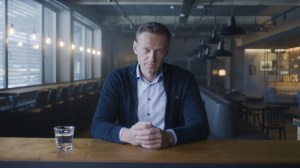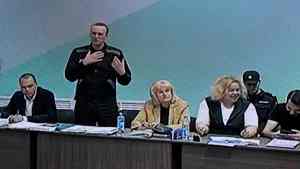UPDATED from 10:43 a.m. story with quotes from Navalny director Daniel Roher: EXCLUSIVE: Oscar-winning filmmaker Daniel Roher, director of Navalny, is reacting to the 19-year prison sentence against the Russian opposition leader rendered by a court outside Moscow today.
“It’s very upsetting, but very unsurprising,” Roher tells Deadline. “The regime has taken the approach of what I like to call ‘boiling the frog.’ Instead of just throwing a life sentence at Navalny right out of the gate, they have been systematically giving him additional sentences over the course of many years — this latest sentence, which is coming in at 19 years, being the longest and what I think is the most laughable in terms of what they’re accusing him of.
EARLIER: The fate of Alexei Navalny, the jailed Russian opposition leader whose story was told in the Oscar-winning documentary Navalny, has become even more grim.
A court in Russia sentenced Navalny today to another 19 years in prison on charges of “extremism,” according to reports in Russian state media. That sentence will be tacked onto a nine-year term he is already serving after his conviction on a variety of charges seen as bogus and politically motivated by critics of the Kremlin. Navalny ran afoul of Vladimir Putin by accusing the Russian president and his cronies of corruption and incompetence.
Alexei Navalny appears in court in Melekhovo, Russia on June 19, 2023.
Photo by Natalia KOLESNIKOVA / AFP
Navalny, who has been serving his sentence in a penal colony 150 miles east of Moscow, had anticipated a harsh judgment. In a statement posted to his Telegram social media account on Thursday, Navalny wrote, “The term will be long, what is called ‘Stalinist.’ The formula for calculating it is simple: what the prosecutor asked for, minus 10-15%. They asked for 20, they give 18 or something like that.” He predicted he will eventually get an additional 10-year sentence for a pending charge of terrorism.
Roher’s film documents the potent political movement Navalny built in Russia through his anti-corruption campaign. The Kremlin, fearing his rising popularity and chagrined by his attacks, allegedly cooked up a plot to poison him with the military-grade nerve agent Novichok. Navalny fell deathly ill in August 2020 while returning to Moscow on a flight from a Siberian city. Eventually, he was flown to Germany for treatment, where he slowly recovered.

‘Navalny’
CNN Films
Navalny shows him investigating his own poisoning with the help of journalist Christo Grozev. In one dramatic scene in the film, Navalny phones a scientist suspected of involvement in the assassination plot and — while pretending to be a government official – induces the man to admit to the near fatal scheme.
In January 2021 Navalny returned to Russia, landing at a Moscow area airport. He was immediately arrested upon his arrival and has remained behind bars ever since.

Yulia Navalnaya address the Oscar audience March 12, 2023.
ABC via Getty Images
Roher attended the Academy Awards in March with Navalny’s wife, Yulia Navalnaya, and the Navalnys’ children. After Navalny was announced as the winner of Best Documentary Feature, he brought the family onto the stage with him. In perhaps the single most dramatic moment of the Oscar telecast, Roher invited Navalnaya to address the audience. “My husband is in prison just for telling the truth. My husband is in prison just for defending democracy,” she said, adding, “Alexei, I’m dreaming of the day when you will be free and our country will be free. Stay strong.”

Daniel Roher accepts the Best Documentary Feature Oscar for ‘Navalny’
Kevin Winter/Getty Images
Roher, in his comments on the Oscar stage, dedicated his victory to Navalny and “to all political prisoners around the world. Alexei, the world has not forgotten your vital message to us all. We cannot, we must not be afraid to oppose dictators and authoritarianism wherever it rears its head.”
In a conversation by phone with Deadline today, Roher commented, “That family so profoundly changed my life. It’s hard, if your father or your husband was looking down the barrel at, what is it now, 30 years, 35 years, what could be a life sentence. It’s devastating. It’s painful, and it’s on the backdrop of this horrible war. I can’t imagine that it’s a happy day for his family. It must be incredibly painful and very difficult.”
Navalny was locked up, initially, a year before Russia’s invasion of Ukraine. The ongoing war has seen the Kremlin treat political dissent even more harshly than before. In April, activist and journalist Vladimir Kara-Murza was sentenced to 25 years in prison on a charge of treason after he criticized Russia’s attack on Ukraine. Opposition political figure Ilya Yashin was slapped with an eight-and-a-half-year prison sentence in December 2022 for highlighting alleged Russian war crimes in Ukraine.
“A few years ago, Russia was like ‘dictatorship lite.’ And [with] this invasion, they’ve gone full authoritarian dictatorship. We see not one morsel of tolerance for any descent, anyone speaking out against the war, anyone speaking out about the Kremlin,” Roher said, adding a reference to Yevgeny Prigozhin, leader of the Wagner mercenary group, who staged a recent short-lived revolt against the government. “The irony is that you can, if you’re the right person, march a mercenary army within 150 miles of the Kremlin and kill 11 Russian service members and nothing will happen to you. But if you’re Alexei Navalny, they’ll put you in prison, give you a 19-year prison sentence for nothing. That’s the state of things in Russia today.”

